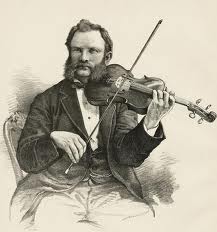Annotation:Piper's Weird (The): Difference between revisions
(Created page with "=='''Back to [[{{BASEPAGENAME}}]]'''== ---- <p><font face="garamond, serif" size="4"> '''PIPER’S WEIRD, THE''' (Macrimmon). Scottish, Pibroch (6/8 time). A Major. Standard...") |
m (Text replacement - "garamond, serif" to "sans-serif") |
||
| (6 intermediate revisions by one other user not shown) | |||
| Line 1: | Line 1: | ||
=='''Back to [[{{BASEPAGENAME}}]]'''== | =='''Back to [[{{BASEPAGENAME}}]]'''== | ||
---- | ---- | ||
<p><font face=" | <p><font face="sans-serif" size="4"> | ||
'''PIPER’S WEIRD, THE''' (Macrimmon). Scottish, Pibroch (6/8 time). A Major. Standard tuning (fiddle). AB. Composed by the great | '''PIPER’S WEIRD, THE''' (Macrimmon). Scottish, Pibroch (6/8 time). A Major. Standard tuning (fiddle). AB. Composed by the great Scottish fiddler-composer J. Scott Skinner (1843-1927). The title is from a poem by W. McCombie Smith (thought to have been a school-master in the north-east of Scotland) of the same title, honoring in the famous piping family of Macrimmon. It begins:[[File:skinner.jpg|300px|thumb|left|J. Scott Skinner]] | ||
<blockquote> | <blockquote> | ||
''The slogan of war is heard in the glen,''<br> | ''The slogan of war is heard in the glen,''<br> | ||
| Line 13: | Line 13: | ||
''Macrimmon goes forth to conquer and die.''<br> | ''Macrimmon goes forth to conquer and die.''<br> | ||
</blockquote> | </blockquote> | ||
The MacCrimmons were hereditary pipers to the MacLeods of Dunvegan, Isle of Skye. This lament is said to have been written by their piper Donald Bàn MacCrimmon, a reluctant participant in the crown forces arrayed against the Highlanders of Bonnie Prince Charlie in the rising of 1745. MacCrimmon was following the command of his laird, but had a presentiment of his death. The meaning of 'weird' in the title means 'destiny' or fate, and comes from Old English ''wyrd'', from the still older Proto-Germanic ''wurdis'', the etymological sense of which was "that which comes about". | |||
<br> | |||
<br> | <br> | ||
</font></p> | </font></p> | ||
<p><font face=" | <p><font face="sans-serif" size="4"> | ||
''Source for notated version'': | ''Source for notated version'': | ||
<br> | <br> | ||
<br> | <br> | ||
</font></p> | </font></p> | ||
<p><font face=" | <p><font face="sans-serif" size="4"> | ||
''Printed sources'': S. Johnson ('''A Twenty Year Anniversary Collection'''), 2003; p. 14. Skinner ('''Harp and Claymore'''), 1904; p. 150 (includes a variation set). | ''Printed sources'': S. Johnson ('''A Twenty Year Anniversary Collection'''), 2003; p. 14. Skinner ('''Harp and Claymore'''), 1904; p. 150 (includes a variation set). | ||
<br> | <br> | ||
<br> | <br> | ||
</font></p> | </font></p> | ||
<p><font face=" | <p><font face="sans-serif" size="4"> | ||
''Recorded sources'': <font color=teal></font> | ''Recorded sources'': <font color=teal>Saucy Bess - "The Piper's Weird" (2014). Two Wild Women Records, Whalebone - "Rootsy, Folky, Live and Funky" (2009). | ||
</font> | |||
<br> | |||
<br> | |||
</font></p> | |||
<p><font face="sans-serif" size="4"> | |||
See also listing at:<br> | |||
Alan Snyder's Cape Breton Fiddle Recordings Index [http://www.cbfiddle.com/rx/tune/t24.html]<br> | |||
See Skinner's handwritten notation at the Univ. of Aberdeen's Skinner site [http://www.abdn.ac.uk/scottskinner/display.php?ID=JSS0173]<br> | |||
Hear the tune played on fiddle by Aberdeenshire fiddler Ned Stewart at Tobar an Dualchais [http://www.tobarandualchais.co.uk/en/fullrecord/21724/10;jsessionid=B8ED2247591D38B2A7B94FC6C735039A][http://www.tobarandualchais.co.uk/en/play/21724;jsessionid=D72EC8303DB6B7B5C6AF71769E622309]<br> | |||
</font></p> | </font></p> | ||
<br> | <br> | ||
Latest revision as of 14:34, 6 May 2019
Back to Piper's Weird (The)
PIPER’S WEIRD, THE (Macrimmon). Scottish, Pibroch (6/8 time). A Major. Standard tuning (fiddle). AB. Composed by the great Scottish fiddler-composer J. Scott Skinner (1843-1927). The title is from a poem by W. McCombie Smith (thought to have been a school-master in the north-east of Scotland) of the same title, honoring in the famous piping family of Macrimmon. It begins:

The slogan of war is heard in the glen,
It thrills through the hearts of women and men;
The bravest go forth with broadsword and shield,
The dauntless in heart who never will yield.
I go, I go, no more to return,
My pipes’ last blast the foe long shall mourn,
A long farewell, O loved land of Skye!—
Macrimmon goes forth to conquer and die.
The MacCrimmons were hereditary pipers to the MacLeods of Dunvegan, Isle of Skye. This lament is said to have been written by their piper Donald Bàn MacCrimmon, a reluctant participant in the crown forces arrayed against the Highlanders of Bonnie Prince Charlie in the rising of 1745. MacCrimmon was following the command of his laird, but had a presentiment of his death. The meaning of 'weird' in the title means 'destiny' or fate, and comes from Old English wyrd, from the still older Proto-Germanic wurdis, the etymological sense of which was "that which comes about".
Source for notated version:
Printed sources: S. Johnson (A Twenty Year Anniversary Collection), 2003; p. 14. Skinner (Harp and Claymore), 1904; p. 150 (includes a variation set).
Recorded sources: Saucy Bess - "The Piper's Weird" (2014). Two Wild Women Records, Whalebone - "Rootsy, Folky, Live and Funky" (2009).
See also listing at:
Alan Snyder's Cape Breton Fiddle Recordings Index [1]
See Skinner's handwritten notation at the Univ. of Aberdeen's Skinner site [2]
Hear the tune played on fiddle by Aberdeenshire fiddler Ned Stewart at Tobar an Dualchais [3][4]
